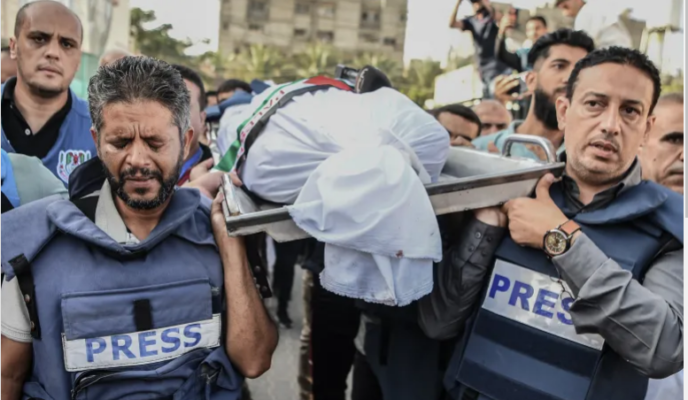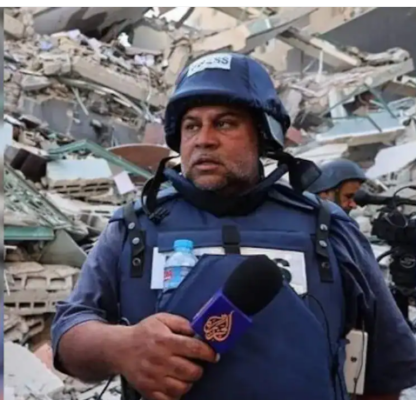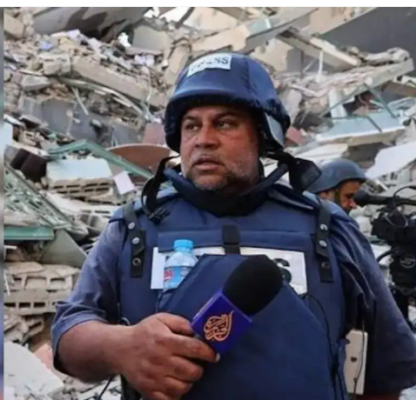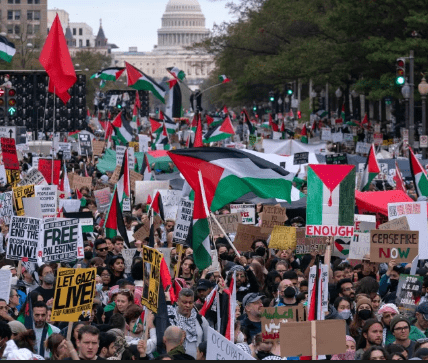Global Outcry Escalates as Israel’s Airstrike Raises Grave Concerns Over Press Freedom and Al-Jazeera’s Journalists’ Safety in Conflict Zones
In a deeply distressing turn of events, Israel executed a targeted airstrike on a vehicle carrying Al-Jazeera journalist Hamza Dahdouh and freelance journalist Mustafa Thuraya. This heart-wrenching incident, which transpired on a fateful Sunday, resulted in the tragic loss of a third passenger, Hazem Rajab. The journalists were en route to interview civilians who had been forcibly displaced by Israel’s intense bombing of residential homes in Gaza.
Hamza Dahdouh, the son of Wael Dahdouh, Al-Jazeera’s bureau chief in Gaza, fell victim to the attack. Wael Dahdouh, who himself sustained injuries in a previous strike in December, expressed profound grief at the burial of his son, stating, “Hamza was everything to me, the eldest boy, he was the soul of my soul. 
This egregious airstrike has heightened serious concerns regarding the perilous safety of journalists operating in conflict zones. Al-Jazeera, in an unequivocal statement, condemned the attack and underscored the urgent need for immediate legal actions against the occupying forces to ensure accountability.
The Committee to Protect Journalists (CPJ) strongly rebuked Israel’s conduct in the ongoing conflict, citing an unprecedented “record toll” on journalists. Sherif Mansour, spokesperson for CPJ, drew attention to the Israeli army’s alarming distinction of surpassing all other entities in journalist fatalities within a mere 10-week span. This grim reality complicates the documentation and understanding of the complexities inherent in the ongoing conflict.
Since the commencement of the latest phase of the conflict in mid-December, a staggering toll of at least 68 journalists has lost their lives. It is imperative to contextualize these casualties within the broader historical framework of the Israeli-Palestinian conflict, where journalists have tragically been frequent casualties. In 2022, the Palestinian-American reporter Shireen Abu Akleh was fatally shot by an Israeli soldier during a raid on a West Bank refugee camp.
Mansour, reiterating established international humanitarian norms, stressed that journalists are civilians and must be treated as such. He called for thorough, independent investigations into the recurring pattern of journalist killings. Additionally, Mansour urged the Israeli army to cease its suppression of international media coverage in Gaza, terminate the harassment of journalists in the West Bank, and facilitate the allowed inflow of information and humanitarian aid into Gaza.
As the global community grapples with the profound loss of Hamza Dahdouh, Mustafa Thuraya, and Hazem Rajab, poignant questions regarding the safety of journalists in conflict zones and the imperative need for accountability take center stage. This tragic incident underscores the critical importance of upholding press freedom and ensuring the safety of journalists reporting from volatile regions.
Grieving Families, Lost Lives: Beyond Statistics
The narrative extends beyond the statistical figures, delving into the human toll exacted by such callous acts. The intertwined story of Hamza Dahdouh and his father, Wael Dahdouh, resonates as a testament to the irreplaceable loss felt by families and communities. The incident serves as a stark reminder of the human cost embedded in conflicts, emphasizing the urgency of global solidarity to prevent further tragedies.
Condolences pour in, and expressions of grief reverberate globally, as the incident becomes emblematic of the broader struggle for press freedom and safety in conflict zones. Swift and impartial investigations, coupled with international pressure to uphold humanitarian standards, are paramount. The tragic fate of these journalists underscores the critical importance of addressing the root causes of conflict and fostering a global environment where journalism can thrive without fear of reprisal.
National and International Outcry: A Call to Action
Zooming out from the localized lens, the international community must reckon with the gravity of this incident. Israel’s airstrike, resulting in the loss of lives of journalists and the silencing of voices aiming to shed light on the ground realities, demands a collective call to action. As governments, organizations, and individuals grapple with the ramifications, there is an urgent need to reevaluate the rules of engagement in conflict zones.
In a world grappling with multifaceted challenges, the loss of these journalists serves as a poignant call to action. The international community must rally behind the principles of press freedom, demanding accountability for those responsible for the unwarranted loss of lives. Beyond the headlines and statistics, the story of Hamza Dahdouh, Mustafa Thuraya, and Hazem Rajab compels us to reflect on our collective responsibility to protect those who strive to illuminate the truth, even in the face of adversity.
Charting a Path Forward: Press Freedom in Peril
The incident underscores the critical importance of international bodies and governments intervening to ensure the safety of journalists in conflict zones. The brazen attack on Al-Jazeera journalists not only silences individual voices but also threatens the broader concept of press freedom. In the wake of this tragedy, governments worldwide must reassess their commitment to upholding journalistic freedoms and take concrete steps to protect journalists operating in conflict-ridden areas.
Read More News:
- Giuliani’s Legal Woes Deepen as Judge Denies Extension in Georgia Election Case
- Tennessee Legislators Respond to a Disturbing Spike in Animal Abuse Reports
- Explosions Claim 95 Lives During Soleimani Memorial Event
As the global community grapples with the profound loss of Hamza Dahdouh, Mustafa Thuraya, and Hazem Rajab, poignant questions regarding the safety of journalists in conflict zones and the imperative need for accountability take center stage. This tragic incident underscores the critical importance of upholding press freedom and ensuring the safety of journalists reporting from volatile regions.



